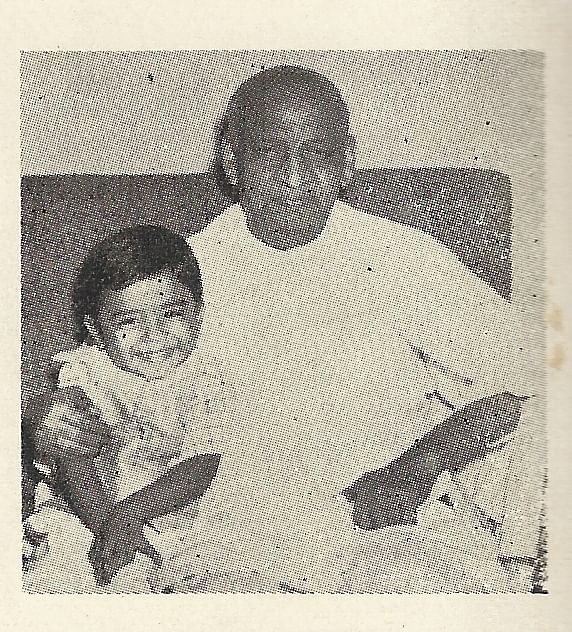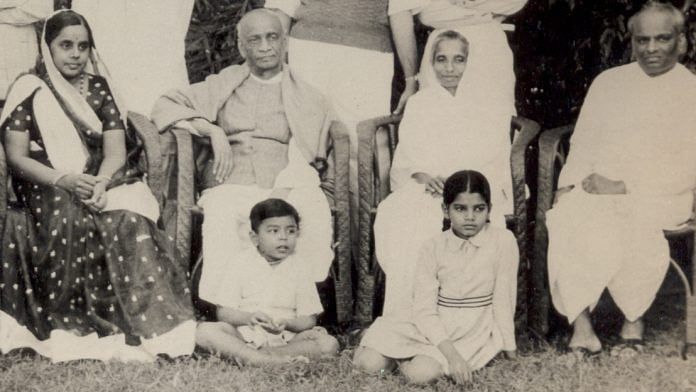Sardar Patel’s four family members fought Lok Sabha elections.
Sardar Patel wanted his family to ensure that his name isn’t misused politically. But his family could not stay away from politics, and this is one political dynasty that is hardly talked about even today.
Sardar Patel’s four family members fought elections: son Dahyabhai, daughter Maniben, daughter-in-law Bhanumati and her businessman-brother Pashabhai Patel.
Dahyabhai, the son
Dahyabhai Patel was a Congressman and an elected member of the Bombay Municipal Corporation in 1939, when Sardar Patel was still around. He spent 18 years at the corporation, out of which he was a leader of the Congress party for six years.
Also read: How an engineer and 2 high-flyers became Gandhi’s men
As per Dahyabhai’s own account in the preface of his book Rajyasabha maan Pahelun Varsha (First Year in Rajya Sabha), he was all set to fight the 1957 Lok Sabha election as a Congress candidate. The president of Gujarat Provincial Congress Committee was also eager to field him as a candidate. Although Gujarat didn’t come into existence as a separate state then, the Congress had separate linguistic units for long.
But according to Dahyabhai, the Congress under Prime Minister Jawaharlal Nehru was not willing to acknowledge Sardar Patel’s contribution and it became all too apparent at the annual session of Congress in January 1957. A member wanted to propose that Sardar Patel’s contribution be mentioned in the document at the Indore annual session of the Congress party. But the idea was dropped. And, this prompted Dahyabhai to leave the Congress the same year.
The movement for a separate Gujarat state started in 1956, and was in full steam by 1957. A newly formed party Maha Gujarat Janta Parishad, under the leadership of Indulal Yajnik, a veteran ex-Congressman, was making waves. Dahyabhai was requested to fight the 1957 Lok Sabha elections as a Parishad candidate.
But, as Indulal noted in his autobiography, Maniben rebuked her brother with tears in her eyes and said: How could he think of running against the Congress party when their father was no more? (Part 6, p.88, Aatmakatha). Eventually, Dahyabhai became vice president of the Parishad and was elected to Rajya Sabha as a Parishad member in 1958.
Dahyabhai was an insurance man, working with the Oriental Insurance Company. He lost his first wife at the age of 27 and remarried. Sardar Patel advised Dahyabhai, through several letters, to keep calm and not to behave harshly. He didn’t share good rapport with his sister Maniben.
Maniben, the daughter
Maniben, daughter of Sardar Patel, was a dedicated aide, a self-effacing personality and lived in her father’s shadow during his lifetime. After Sardar’s death, she plunged into national electoral politics even before Dahyabhai did. She fought the first Lok Sabha election (1952) from Kheda (South) constituency as a Congress candidate and won with a margin of 59,298 votes.
Also read: Gandhi is a Mahatma, I am not, said Sardar Patel
Maniben stayed on with the Congress even after Dahyabhai left it, and won the 1957 Lok Sabha election from Anand constituency with a margin of 37,429 votes.
Swatantra Party
Many Sardar Patel loyalists who felt his memory was being wronged in the Congress party threw their weight behind the new Swatantra Party in 1959. Dahyabhai also joined Swantatra Party, but Maniben’s loyalty towards the Congress remained unwavered.
The 1962 Lok Sabha elections were the first after the formation of the Gujarat state in 1960. They brought paradoxical results for Sardar Patel’s family members. Maniben filed her nomination as a Congress candidate from Anand constituency, comprising the Charotar area, her father’s home ground. Her opponent Narendrasinh Mahida was from her brother’s Swatantra Party.
In Gujarat, the Swatantra Party was led by Bhailalbhai Patel. Fondly known as Bhaikaka, he was a visionary engineer, a Sardar Patel loyalist and creator of an exemplary education city Vallabh Vidyanagar (named after Sardar). In an ironical twist, Maniben lost the Anand seat with a margin of 22,729 votes. She had to pay the price for being in the Congress party, when the anti-Congress sentiment was popular because of the Mahagujarat Movement.
Bhanumati Patel, the daughter-in-law
During the 1962 Lok Sabha elections, Dahyabhai was already a Rajya Sabha MP. So, his wife Bhanumati Patel and brother-in-law Pashabhai Patel were fielded by Swatantra Party for the seats of Bhavnagar and Sabarkantha respectively. Bhanumati Patel, caught in a triangular contest between the Congress, the Praja Socialist Party and her own Swatantra Party, lost badly. She won just 14,774 (7.35 per cent) votes and lost her deposit.
Her brother Pashabhai also lost, but more respectably. He gave a good fight to his opponent Gulzarilal Nanda, a union minister, and lost by 24,609 votes. This was not the first election for Pashabhai Patel. He fought the Lok Sabha elections of 1957 against Fatehsinhrao Gaekwar from Baroda and lost by 63,646 votes.
In 1967, Acharya Kripalani was to fight from Baroda seat as a Swatantra Party candidate. But after his withdrawal, ‘the party then yielded to the insistent demand of a Baroda industrialist, Mr Pashabhai Patel, for nomination’, (The Times of India, Swatantra Expects To Win Baroda Seat, 9 February 1967) and he won by 22,317 votes.
Bhanumati Patel’s name was also chosen by the party for Bharuch seat before 1967 Lok Sabha elections, but The Times of India said, ‘Mrs Patel wanted the party to finance her poll campaign. The party expressed its inability to do so’. (The Times of India, 5 December 1966) Her name is not found anywhere in the 1967 election data.
Maniben & Dahyabhai’s later years
After losing the 1962 Lok Sabha elections, Maniben went to Rajya Sabha in 1964 as a Congress member and remained an MP till 1970. When she decided to fight the Lok Sabha bypoll in 1973 from Sabarkantha constituency, the Congress was already divided and she chose to remain with the old guard and won comfortably.
After the Emergency, Maniben fought the 1977 Lok Sabha elections from Mehsana constituency under the banner of the Bharatiya Lok Dal. It was her last election, and she won with a hefty margin of over 1.22 lakh votes.
Maniben died in 1990 at the age of 87, after almost three decades of being an MP. She led a simple but active public life, and was associated with many Gandhian institutions till death. Dahyabhai, the Mayor of Bombay in 1954, entered Rajya Sabha in 1958, was elected thrice and remained a Rajya Sabha MP till his death in 1973 at the age of 67. He was remembered in his obit as ‘an outspoken Swatantra leader and a stalwart parliamentarian’.

Prime Minister Indira Gandhi, in a message to Maniben, wrote, “We shall miss an old friend and colleague in Parliament”. Party members remembered his life as a “fighter first against the British, and after Independence for the cause of democracy, freedom and free enterprise”. (The Times of India, 12 August 1973)
Maniben never married. Dahyabhai had two sons: Vipin and Gautam. Both of them stayed away from politics, media attention and didn’t entertain the use of their name in political mud-slinging. In a rare interview at his Mumbai flat in 1999 (where Sardar Patel used to stay during his earlier Mumbai visits), Gautam Patel told me how averse he was to political abuse of Sardar’s name and how his family never used it. (Sandesh, Sardar Na Vaarasdaaro, 2 November 1999)
Also read: BJP wants to revoke Article 370, ironically Sardar Patel was its architect
Gautam Patel and his wife Nandita Patel are in the US with their son Kedar right now, and news reports say they will not be attending Prime Minister Narendra Modi’s inaugural function for the Statue of Unity in Gujarat.
Urvish Kothari is a senior columnist and writer in Ahmedabad.




Congress is full of hangers on who can only be MPs and MLAs by invoking the present dynasty’s name and prostrating before it. Sardar Patel was great. But, he cannot get them what the ‘dynasty’ can give now. The irony is that the ‘Dynasty’ can only give them the ‘Ticket’ to contest. But the days when it also brought in ‘Votes’ are long past. Voters are spurning the very name of Congress on a ballot paper ( or the EVM).
Nehru made Sardar Patel’s daughter MP but never his own daughter. This should debunk Congress or Nehru ignoring Patel. Even when Maniben lost in 1962, she was made MP through Rajya Sabha by Nehru. This should debunk any myths of Nehru starting any dynasty. Nehru groomed great leaders like VK Krishna Menon and Lal Bahadur Shastri as PM candidates.
Lal Bahadur Shastri had no chance of becoming PM if Nehru had not backed him.
Indira Gandhi was being nurtured into the party, she was made/elected President of the Congress Party in 1959 and made Minister of State for Information and Broadcasting in 1964 after her father’s death, how you can assert that Nehru gave no politically profitable post was held by none of Nehru’s progeny.
It is apparent from the beginning that Nehru never wanted to acknowledge the contribution of Sardar Patel in the integration of India as a united country. Patel too had the inkling of Nehru’s intentions. Hence he advised his family members not to use his name in electoral politics, because he knew that Nehru will do his best to ensure the defeat of his family members to malign Patel’s legacy. The history is witness of his feelings.
Sardar Patel was never threat to Nehru, let alone when dead. This claim that there was no other leader in India except Nehru, Patel and Bose is insult to a generation of great leaders. Swatantra Party was founded by Rajaji whon Gandhi once declared as political successor. Sardar Patel sabotaged Nehru’s plans to make Rajaji the President of India. VK Krishna Menon was even denied ticket to his North Bombay constituency which he represented for 10 years and polled twice as many votes as his opponent. Congress named 150 institutions after Sardar Patel. It is never enough! How many institutions were named after Rajaji either by Congress or other parties?
This fake must be an Arabic based muslim writer or a Chinese or Pakistani funded ideology who wants to visit tajmahal which is built on destroyed Shiva temple just like many of UR historical monuments r built by shattering our temples n our gurdwaras. With it ideology bullet train would be an affair of next mellenium when China built same fake Arabic funded ideology like u detailed Chinese bullet trains n now see where an age old poor China stands is next to America. U want to travel in Chinese bullet trains and spend vacations in Singapore but never want hindus to grow Bec ur a follower of mugals Turks who only hate growing Indians… Shameless thoughts if print can sack u I won’t be dreaming… Jai Hind.. hindus are proud of their legacy always..